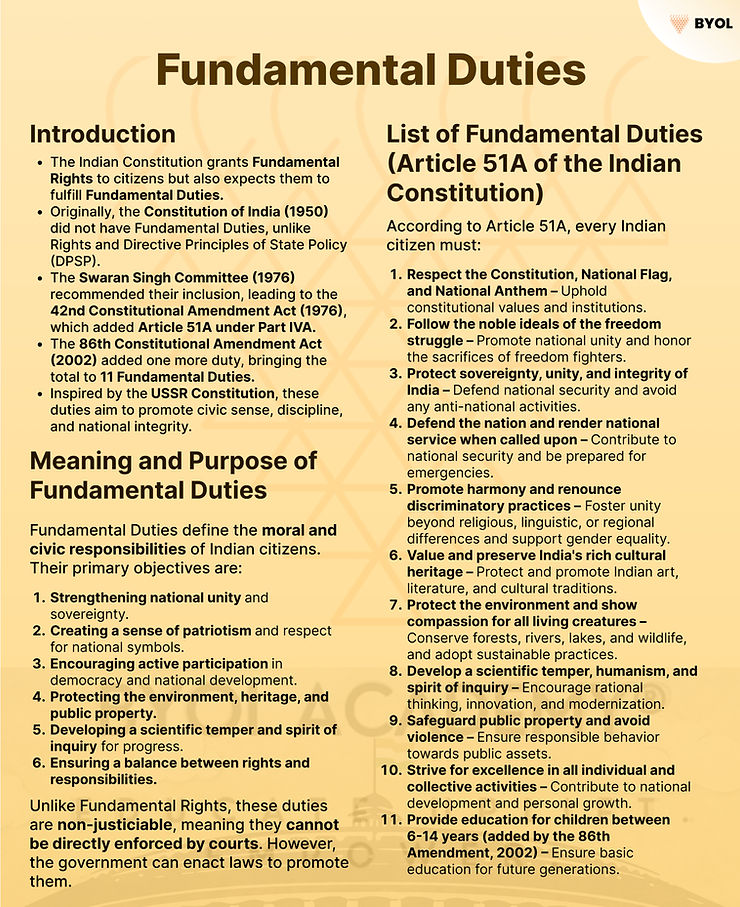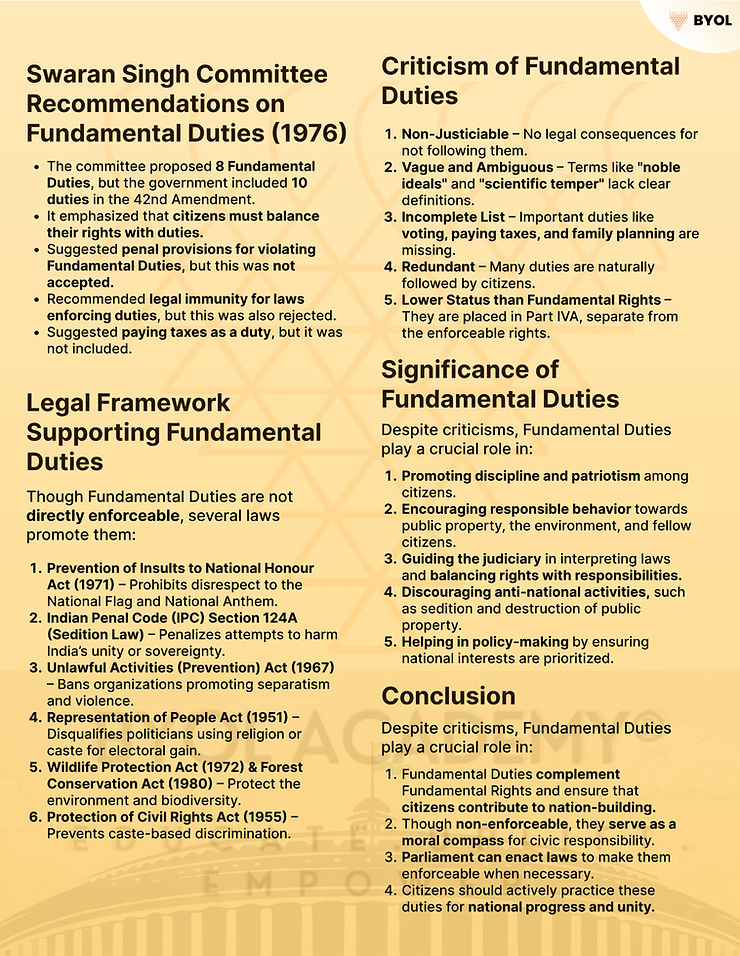Introduction
The Indian Constitution provides for the rights and duties of the citizens of the country. It is a comprehensive document that provides for rights and expects duties from the citizens. Though Fundamental Rights were a part of the original constitution, Fundamental Duties were introduced later. They were introduced to remind the citizens of their moral duty towards the country. The duties are a constant reminder that rights and duties are interrelated. They ensure that there is a balance between the freedom of an individual and the harmony of the society.
Meaning of Fundamental Duties
Fundamental Duties essentially include the ethical and civic obligations of every Indian citizen. This is in order to enhance the unity, integrity and development of the nation. These duties, which were taken from the USSR Constitution, were incorporated into the Indian Constitution. This was through the 42nd amendment Act, 1976. Among the duties are patriotism, respect for national symbols and the ideals enshrined in the Constitution. The duties are non-justiciable, implying that they cannot be enforced by law. However, they play a significant role in moulding responsible citizens.
Swaran Singh Committee Recommendations
In 1976, during the period of Internal Emergency (1975–1977), the Congress Party set up the Sardar Swaran Singh Committee to examine the need for Fundamental Duties in the Constitution. The committee emphasized that while citizens enjoy Fundamental Rights, they should also recognize their duties toward the nation.
Based on its recommendations, the 42nd Constitutional Amendment Act, 1976, was enacted, introducing Part IVA in the Constitution. This part contains Article 51A, which originally listed ten Fundamental Duties for citizens. The ruling Congress Party called the absence of Fundamental Duties in the original Constitution a historical mistake, asserting that their inclusion was a necessary correction.
Key Recommendations of the Committee
- Inclusion of a separate chapter on Fundamental Duties in the Constitution.
- Emphasis on the idea that citizens must balance their rights and responsibilities.
- Initially, the committee proposed eight Fundamental Duties, but ten were added in the final amendment.
Recommendations Not Accepted
Certain recommendations by the Swaran Singh Committee were not incorporated into the Constitution, including:
- Legal enforcement of Fundamental Duties – The committee suggested penalties or punishments for violating duties, but this was not accepted.
- Judicial immunity for such laws – The recommendation that laws enforcing duties should not be challenged in court was rejected.
- Duty to pay taxes as a Fundamental Duty – This was suggested but not included in Article 51A.
Although Fundamental Duties remain non-justiciable, they serve as a moral guide, reinforcing the responsibility of every citizen toward the nation’s welfare.
List of Fundamental Duties
According to Article 51A of the Indian Constitution, it shall be the duty of every citizen of India:
- To abide by the Constitution and respect its ideals and institutions, the National Flag, and the National Anthem.
- To cherish and follow the noble ideals that inspired the national struggle for freedom.
- To uphold and protect the sovereignty, unity, and integrity of India.
- To defend the country and render national service when called upon to do so.
- To promote harmony and the spirit of common brotherhood among all people of India, transcending religious, linguistic, and regional diversities, and to renounce practices derogatory to the dignity of women.
- To value and preserve the rich heritage of India’s composite culture.
- To protect and improve the natural environment, including forests, lakes, rivers, and wildlife, and to have compassion for living creatures.
- To develop scientific temper, humanism, and the spirit of inquiry and reform.
- To safeguard public property and abjure violence.
- To strive towards excellence in all spheres of individual and collective activity so that the nation constantly rises to higher levels of endeavor and achievement.
- To provide opportunities for education to one’s child or ward between the age of six and fourteen years. (Added by the 86th Constitutional Amendment Act, 2002).
These Fundamental Duties act as a moral and civic guide, ensuring responsible citizenship and active participation in nation-building.
The Characteristics of Fundamental Duties.
Fundamental Duties in the Indian Constitution has the following characteristics:
Intended for citizens
1. Combination of Moral and Civic Duties – Some of the Fundamental Duties are moral obligations, such as cherishing the ideals of the freedom struggle, while others are civic responsibilities, like respecting the Constitution, National Flag, and National Anthem.
2. Reflect Indian Traditions and Values – Based on the rich cultural heritage, myths, and religious beliefs of India, the duties reflect the Indian way of life and are an extension of it rather than being completely new obligations.
3. Applicable Only to Citizens – Unlike certain Fundamental Rights, which extend to both citizens and foreigners, Fundamental Duties apply only to Indian citizens.
4. Non-Justiciable but Enforceable Through Legislation – Like the Directive Principles of State Policy (DPSP), Fundamental Duties are non-justiciable, in other words, courts cannot enforce them directly. However, Parliament has the power to make them enforceable through legislation if it deems it necessary.
While these are not legally binding, Fundamental Duties serve as a reminder that with rights come responsibilities, and thus citizens are not only the consumers of the state, but they also contribute to its unity and progress.
Fundamental Duties Criticism
Incomplete List – Major responsibilities such as voting, paying taxes, and family planning are left out.
Vague and Ambiguous – Terms like noble ideals and scientific temper lack clarity.
Non-Justiciable – Moral character makes these rights unenforceable,
Redundant – Citizens would perform these duties naturally, making their inclusion unnecessary.
Lower Status – Inclusion in Part IVA, downgrading their importance compared to Fundamental Rights.
Despite criticisms, they serve as a moral guide for responsible citizenship.
Significance of Fundamental Duties
- Balance of Rights and Duties – They remind citizens that pleasure in rights entails obligations towards the nation and society.
- Deterrence Against Anti-National Activities – National flag burning or public property damage acts are discouraged.
- Foster Patriotism and Discipline – They instill a sense of commitment, responsibility, and active participation in national progress.
- Aid in Constitution Interpretation – Courts may uphold laws protecting Fundamental Duties as reasonable under Article 14 and Article 19.
- Enforceable Through Legislation– Parliament may impose penalties for violating Fundamental Duties.
H.R. Gokhale, the then Law Minister, justified the inclusion of Fundamental Duties by highlighting the lack of responsibility among certain sections of society, particularly during the Emergency of 1975. He believed these duties would have a sobering effect on anti-national activities.
Indira Gandhi defended them as essential for democratic balance, ensuring that citizens were equally aware of their duties as they were of their rights.
Despite opposition, the Janata Government (1977-79) did not repeal Fundamental Duties, though it reversed several other changes made by the 42nd Amendment Act (1976). The continued acceptance of these duties, further reinforced by the 86th Amendment Act (2002), highlights a broad consensus on their necessity.
Verma Committee on Fundamental Duties
The Verma Committee on Fundamental Duties (1999) examined the legal provisions that support the enforcement of Fundamental Duties. It identified several laws that align with these duties:
- Prevention of Insults to National Honour Act (1971) – Prohibits disrespect to the Constitution, National Flag, and National Anthem.
- Criminal Laws – Penalize actions that promote enmity on grounds of language, race, religion, or place of birth.
- Protection of Civil Rights Act (1955) – Punishes offenses related to caste and religion-based discrimination.
- Indian Penal Code (IPC) – Declares threats to national integration as punishable.
- Unlawful Activities (Prevention) Act (1967) – Allows the government to ban communal organizations.
- Representation of People Act (1951) – Disqualifies politicians who engage in corrupt practices, such as soliciting votes based on religion or caste.
- Wildlife (Protection) Act (1972) – Bans trade in endangered species.
- Forest (Conservation) Act (1980) – Prevents deforestation and unauthorized land use.
These laws provide a legal framework to uphold the spirit of Fundamental Duties, reinforcing national integrity, environmental protection, and social harmony.




